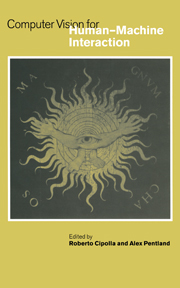Foreword: Out of Sight, Out of Mind
Published online by Cambridge University Press: 06 July 2010
Summary
Face it. Butlers cannot be blind. Secretaries cannot be deaf. But somehow we take it for granted that computers can be both.
Human-computer interface dogma was first dominated by direct manipulation and then delegation. The tacit assumption of both styles of interaction has been that the human will be explicit, unambiguous and fully attentive. Equivocation, contradiction and preoccupation are unthinkable even though they are very human behaviors. Not allowed. We are expected to be disciplined, fully focused, single minded and ‘there’ with every attending muscle in our body. Worse, we accept it.
Times will change. Cipolla, Pentland et al, fly in the face (pun intended) of traditional human-computer interface research. The questions they pose and answers they provide have the common thread of concurrency. Namely, by combining modes of communication, the resulting richness of expression is not only far greater than the sum of the parts, but allows for one channel to disambiguate the other. Look. There's an example right there. Where? Well, you can't see it, because you cannot see me, where I am looking, what's around me. So the example is left to your imagination.
That's fine in literature and for well codified tasks. Works for making plane reservations, buying and selling stocks and, think of it, almost everything we do with computers today. But this kind of categorical computing is crummy for design, debate and deliberation. It is really useless when the purpose of communication is to collect our own thoughts.
- Type
- Chapter
- Information
- Computer Vision for Human-Machine Interaction , pp. vii - viiiPublisher: Cambridge University PressPrint publication year: 1998



